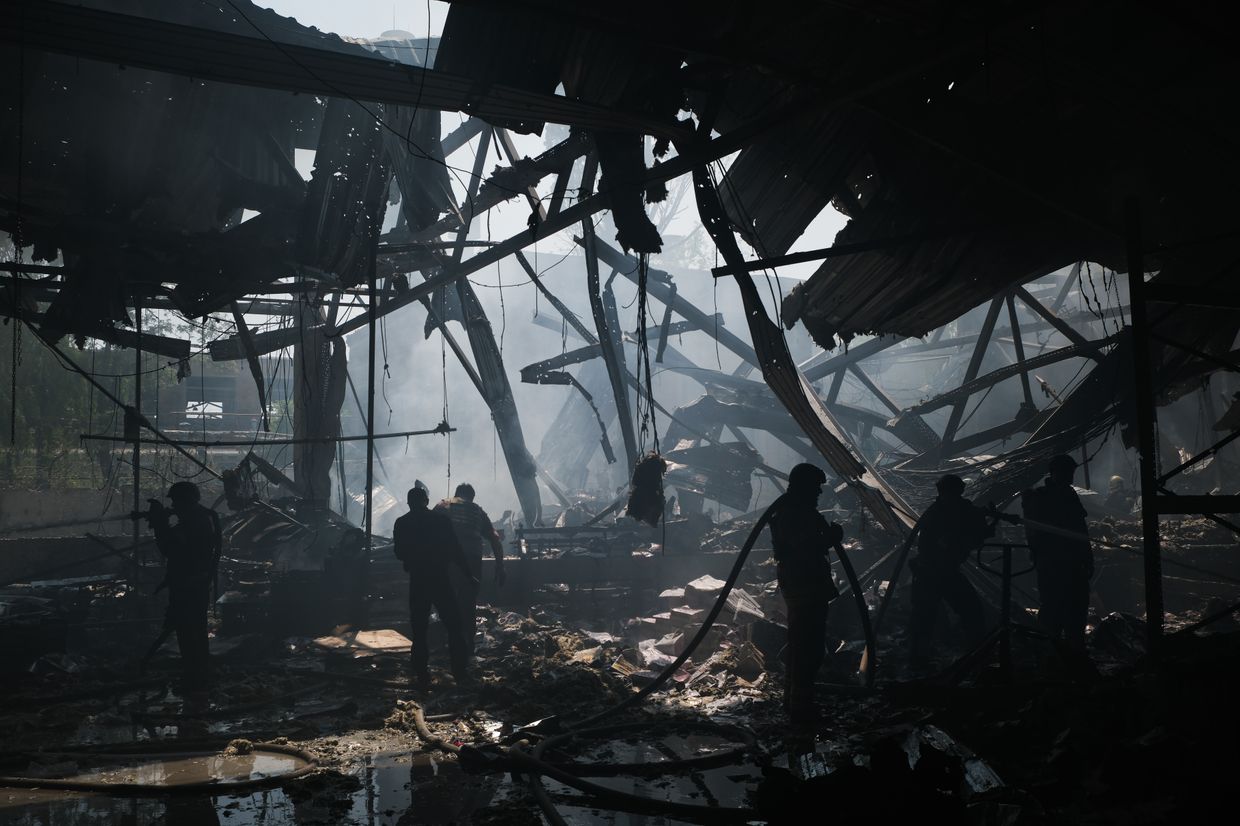What will Russia's attack on Kharkiv printing house mean for Ukraine's publishing industry?

Printed pages from books lie burnt in the Faktor-Druk printing plant's building hit by a Russian S-300 missile in Kharkiv, Ukraine on May 23, 2024. (Ivan Samoilov/Gwara Media/Global Images Ukraine via Getty Images)
The aftermath of Russia’s May 23 attack on Kharkiv’s Faktor Druk printing house shocked Ukrainians: mountains of charred Ukrainian books covered its blackened floor. The strike had destroyed over a quarter of the company’s warehouse.
The 4,000 square meter building is owned by the Faktor group of companies, which includes publishing house Vivat — Ukraine’s third largest printing house.
The country’s literary mecca, Kharkiv, prints 80% of all books published in Ukraine. In recent weeks the city has come under constant attack as Russia opened a new offensive just dozens of kilometers north of the city on May 10.
The strike destroyed over 50,000 books and printing equipment. It also killed seven employees and injured 22. The Faktor group’s total damages from the attack are nearly 5 million euros ($5.4 million), Vivat Publishing House CEO Yulia Orlova told the Kyiv Independent.

Among the destroyed titles were world bestsellers by Elissa Sussman and Maggie O’Farrell, as well as Ukrainian books by Natalia Kornienko and Valeriy Puzik.
Interest in Ukrainian-language books has flourished since Russia invaded Ukraine, as Ukrainians seek to distance themselves from Russian culture and more people switch to speaking, and reading, in Ukrainian. Several new bookstores have opened across the country since February 2022.
A ban on the import of Russian-language books to Ukraine and a law stipulating that foreign language publications, including those in Russian, must be translated into Ukrainian has also given the publishing industry a boost.
The publishing industry has nonetheless suffered from the war and the destruction of Faktor-Druk, accounting for 30% of Ukraine’s printing market, will only worsen the situation, according to publishing houses.
“(The attack) will limit our development as a publishing house. Important books will not be published. New bookstores will not open,” Orlova said.
Faktor-Druk produces books for 30 Ukrainian publishing houses and accounts for a third of books in Ukraine, the company’s CEO Tatyana Grinyuk told the Kyiv Independent.
Operating since 1996, the facility employs over 400 people and churned out 450 million books, newspapers, and magazines every year before the full-scale invasion. On the eve of the full-scale invasion, 20% of the printing house's output was foreign orders for around 200 publishing houses.

While the company says it plans to reopen in the future and has launched a fundraiser, the impact of the strike will significantly delay an already protracted printing process, publishing house Urbino told the Kyiv Independent.
Urbino, which translates foreign publications into Ukrainian, notes that the war has doubled the printing time for books. Moreover, the damage to Faktor-Druk will burden Ukraine’s other printing houses, primarily Kharkiv Unisoft and Globus, Urbino noted.
Ukraїner, a publishing house focussing on Ukrainian culture and history, told the Kyiv Independent that it will have to postpone publishing its books and it will likely cost more as the market has shrunk. Moreover, the remaining Kharkiv printing houses will have to manage increased risks, resulting in higher prices.

“We can’t print books abroad,” Ukraїner founder Bohdan Lohvynenko said. “Taxes and logistics (would) make this book too expensive for the Ukrainian market.”
Relocating printing facilities to Western regions is also out of the picture, Faktor-Druk plant owner Serhiy Polituchy told Radio Free Europe/Liberty. The process would be costly and finding specialists in western Ukraine would also be a challenge if employees refuse to relocate, he added.
Faktor-Druk was not the first printing house to come under attack. Just two months before, a missile destroyed the Hurov&K printing facility during another attack on Kharkiv, head of the Ranok publishing house Viktor Kruglov wrote on Facebook.
Several other printing houses and publishers in Kharkiv have come under attack throughout the duration of the war, according to Ukrainian cultural media Chytomo.
“There is no guarantee that another company will not be the next target of the cynical Russians,” Urbino said.
In addition to books, newspapers, and school diaries, Faktor-Druk printed over 40% of Ukraine’s textbooks, according to Grinyuk. She noted that the consequence of the attack will affect Ukraine’s education, which she says is a deliberate act by Russia.

Grinyuk and Orlova claim the attack was also an attempt to eradicate Ukrainian culture and damage the nation. U.S. historian Timothy Snyder, who has written extensively on Ukraine, labeled it “an example of a larger genocidal policy” in a post on X.
Wider issues such as workforce deficit, power outages, and issues with paper supply, are also causing hurdles for Ukraine’s publishing industry, Vivat told the Kyiv Independent.
In the first months of the war, 39% of Ukrainian publishers were unable to operate, according to the Ukrainian Book Institute. However, the situation improved after the frontlines retreated in the east and south and publishers were able to operate in relative safety.
The number of printed titles skyrocketed from 9,691 in 2022 to 15,187 in 2023, according to the Ukrainian Book Chamber. And book circulation skyrocketed from 11.7 million in 2022 to 24.7 million in 2023.

Following news of the attack, Ukrainians flooded Vivat’s eight bookstores and website amid a call for support.
Last year, Vivat opened four stores in Kyiv, Lviv, Kharkiv, and Ivano Frankivsk, bolstered by Ukraine’s book boom. The company plans to open another in Chernivtsi next month.
According to Orlova, war-weary citizens need a distraction from the everyday horrors but the strike will harm Ukrainian citizens looking for respite.
“In the end, the reader will suffer. They will not receive interesting and useful books,” she said.










